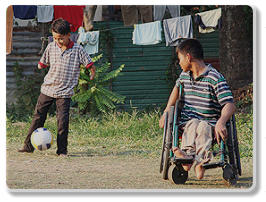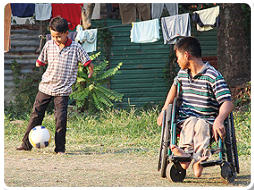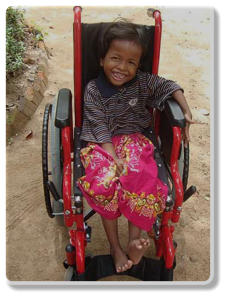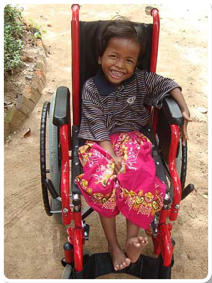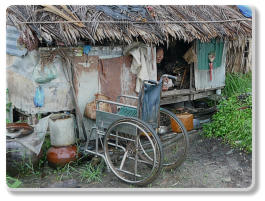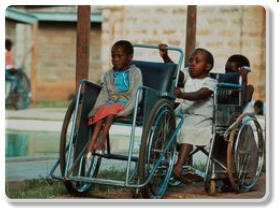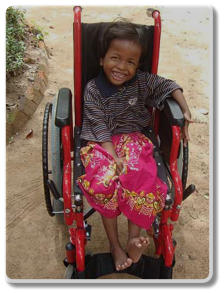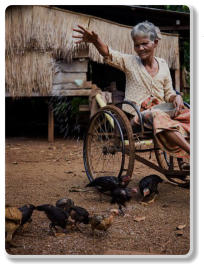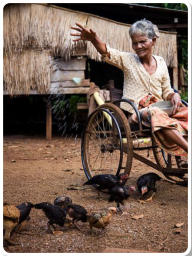

Behinderung durch Armut, das vergessene Übel...
The main reason for the incredible amount of disabled people
worldwide is poverty.
Major deficits for people with disabilities are based on lack of
medical treatment in general, the possibility to gain rehabilitation,
and missing access to the job market as a result
Poverty and disability are mostly a vicious circle:
According to the World Bank 20% of all humans living in extreme
poverty have disabilities. The major quantities of these live in
development countries. Concerned most are children and
women.
6,4% of all children younger than fourteen are disabled in Africa: This is
ways more than in countries with higher income where the share is at
2,8%
Children with handicaps have by far less chance for education then non
handicapped. UNESCO stated as published in 2004 that 98% of
children with disabilities do not attend school at all. According to the
estimation of the WHO some years ago only 1-2% of disabled people
have access to rehabilitation activities and institutions. This is mainly to
the lack of rehabilitation infrastructure and well- trained personnel.
In countries as e.g. Burkina Faso there is one physiotherapist per
10.000 inhabitants. By comparison in Finland the figure is 21 per the
same amount of people.
The Shortage of orthopedic aids is striking.
As to estimations of Whirlwind Wheelchair International only 1% of
people concerned possess a wheel chair because medical supply in
development countries covers only basic needs and demands.
The purchase of a wheel chair with own financial means is not
achievable for the predominant majority of people with disabilities, due to
the fact that because of their personal situation they are excluded from
the job market. Mostly they are hidden by their families and are kept just
alive.
In case of paralysis or multiple sclerosis a wheel chair is of highest
interest. It allows the patient to leave bed frequently to avoid
complications like skin ulcers caused by pressure (decubitus). These
occur with most of disabled lying in bed, due to the lack of muscles and
the resulting permanent pressure from bones onto skin. This can be avoided by mobilization through
wheel chairs. Decubitus causes permanent intense pain that can
only be relieved by painkilling medicine (if available). Normally
bandages have to be exchanged 2 to 3 times a day witch results
in big burden to the patient as well as to the nursing person.
When financial possibilities fail to supply the patient with
medicine and bandages decubital lesion can cause a number of
fatal diseases such as pneumonia, sepsis or even death
Resulting the supply of a wheel chair to the patient can decide
between life or death.
In the western world is the provision of modern and adequate
wheelchairs is a matter of course after accident or disability
from birth. Insurance and health funds finance hospitals nursing
homes, special-care homes and rehabilitation centers that are
equipped with adequate curing means.
In contrast to development countries, where people mostly
have no access to these institutions supply in our society is by
comparison excellent.
That’s why used but fully functioning wheel chairs and other
helping means are classified as scrap metal and replaced by
equipment though the 3rd word has new an immense demand.
Our association’s only issue is to collect wheel chairs before they end up in the scrap press, maintain
and repair them and ship them to the poor to ease their life or prevent them from a torturous death.



